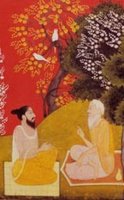 In Upanishad, the sacred text of Hinduism we find some thoughtful verses on the subject matter of abstinence. The ancient sages who wrote the Upanishad tells us that many of the important spiritual practices such as different modes of sacrifice, vow of silence and also fasting are nothing but abstinence.
In Upanishad, the sacred text of Hinduism we find some thoughtful verses on the subject matter of abstinence. The ancient sages who wrote the Upanishad tells us that many of the important spiritual practices such as different modes of sacrifice, vow of silence and also fasting are nothing but abstinence.The talking about abstinence in the Upanishad caught my attention because, interestingly the original arabic word in Islam used for fasting is called "Saum" which literally means to abstain or Abstinence. Just as Saum or Abstinence or Fasting in Islam not only means abstainence from physical or food, but more and beyond; on the similar tone, the wisdom of Upanishad speaks:
1. What people call sacrifice (yagña), that is really abstinence. For he who knows, obtains that (world of Brahman, which others obtain by sacrifice), by means of abstinence.
What people call sacrifice (ishta), that is really abstinence, for by abstinence, having searched, he obtains the Self.
2. What people call sacrifice (sattrâyana), that is really abstinence, for by abstinence he obtains from the Sat (the true), the safety of the Self.
What people call the vow of silence (mauna), that is really abstinence, for he who by abstinence has found out the Self, meditates.
3. What people call fasting, that is really abstinence, for that Self does not perish, which we find out by abstinence.
The Upanishads: Fifth khanda, translated by Max Müller
In the explanation of the verses from Upanishad we find: Abstinence from all worldly enjoyments are means of obtaining a knowledge of Brahman, a knowledge of God.
Whatever we see and feel in this ephemeral world, has been shown to be false; because it consists of forms and names only; yet these forms and names have a true element in them, viz. the Sat (Haqq, the Ultimate Reality, the Truth). Before we know that Sat, all the objects we see in waking seem true; as dreams seem true in dreaming.
But when once we awake from our waking by true knowledge, we see that nothing is true but the Sat (Ultimate Reality). When we imagine we see a serpent, and then discover that it is a rope, the serpent disappears as false, but what was true in it, the rope, remains true. ... And abstinence is a path and spiritual discipline to obtain that special knowledge which ennobles our freedom.
credit: sacred texts website














COMMENTS